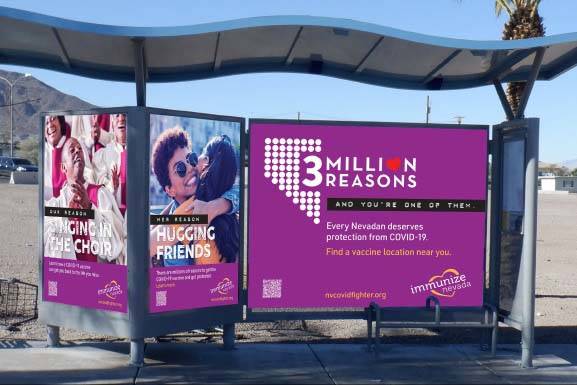Unsure about the COVID vaccine? A new ad campaign might convince you.

With large numbers of Nevadans hesitant about the COVID-19 vaccine, state officials have launched an advertising campaign appealing to their emotions.
The “3 Million Reasons” campaign will remind people in the “hesitancy spectrum” that immunization will allow them to safely gather at high school football games, church and barbecues, state officials announced Thursday. The campaign targets people who are considering vaccination, but are not outright opposed to it.
National statistics from December showed 40 percent to 50 percent of people fell in the “wait and see group” when it came to vaccination, with similar numbers likely in Nevada, said Paige Galeoto, an executive at the Reno-based marketing company Estipona Group, which is spearheading the campaign.
“We all want to return to these missed moments, and COVID vaccination is how we’re going to get back to those things we love,” she said.
The $4 million campaign began in late March, Nevada Department of Health and Human Services spokeswoman Shannon Litz wrote in an email. It is funded through a Centers for Disease and Control and Prevention grant, the majority of which will be spent on advertising costs.
Details about the campaign were shared during Thursday’s state COVID Task Force meeting.
It will include outreach over digital and physical media, including billboards, social media posts and advertising appearing on TV and radio. In Southern Nevada, bus shelters will feature large campaign posters that include QR codes allowing people with smartphones to find and schedule an appointment.
There will also be grassroots outreach in underserved and majority-minority communities.
“When we promote this information, sometimes it has to come from a trusted resource that isn’t always a health care provider,” said David Perez, the Nevada Vaccine Equity Collaborative’s public affairs and community engagement manager. “It could be a local community leader, a faith leader or a sports coach.”
About one-third of Nevadans age 16 and older have begun the vaccination process, according to state data released Wednesday. Eligibility opens to all state residents 16 and older on Monday.
Hispanic and Black residents have gotten vaccinated at lower rates relative to their share of the state’s population, according to state data.
The state’s “3 Million Reasons” campaign will join two outreach campaigns underway in Southern Nevada — “Esta en Tus Manos” and “Back to Life” — that are aimed at raising vaccination rates among Hispanic and Black residents.
State and local health officials plan to host additional small vaccination clinics in and near majority-minority neighborhoods to improve access to residents.
Nevada State Public Health Laboratory director Mark Pandori said he was concerned that the state’s campaign did not address the public’s concerns about the vaccines’ efficacy and safety.
“A large part of the issue here is there’s a lot of people who don’t believe it will work, that it will harm them, or that the variants are rendering it useless,” he said. “If that’s the root problem, then I’m concerned the rest of this doesn’t function well as a solution.”
After a significant decline in new cases since mid-January, state biostatistician Kyra Morgan said Thursday that Nevada’s case rate is stabilizing. In other parts of the country, new cases are increasing at rising rates, leading to concerns about another surge. Nevada has also reported an increasing number of the U.K. COVID-19 variant, believed to be deadlier and more easily transmissible than other coronavirus strains.
Advertisements will direct people to Immunize Nevada’s nvcovidfighter.org website, where they can find fact sheets and videos about how the vaccine works.
“Our focus is on the movable middle,” Galeoto said. “If someone is strongly anti-vaccination, we don’t presume to think that we’re going to change their mind.”
A Review-Journal/The Nevada Poll survey released in March said 73 percent of respondents either had been vaccinated with at least one shot or planned to be vaccinated, versus 63 percent who said in October 2020 that they planned to be vaccinated.
However, 19 percent of respondents didn’t plan to be vaccinated, while 8 percent don’t know or didn’t respond. Their reasons included concern that the development of the vaccines was rushed, belief that COVID-19 is merely a stronger version of the flu, and distrust of politicians and pharmaceutical companies.
Contact Michael Scott Davidson at sdavidson@reviewjournal.com or 702-477-3861. Follow @davidsonlvrj on Twitter.